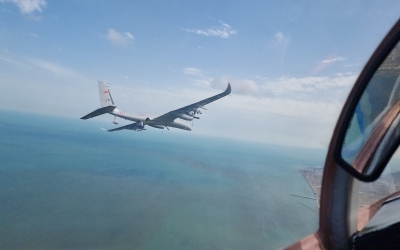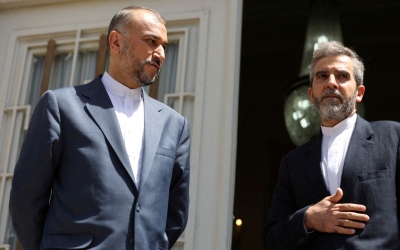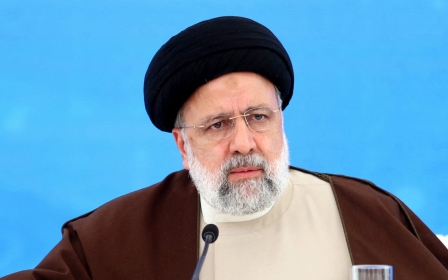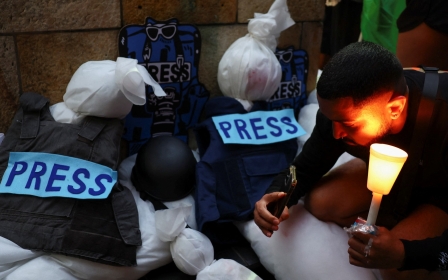Iranian press review: Authorities face backlash for allowing Turkish drone into airspace

Deployment of Turkey’s surveillance drone faces backlash
The deployment of a Turkish high-altitude, long-endurance drone to find the wreckage of the helicopter carrying Iranian President Ebrahim Raisi has sparked criticism in Iran. Many questioned why a drone capable of collecting sensitive information was allowed to enter Iranian territory.
After Iranian authorities struggled to locate the wreck - which crashed on Sunday, killing the president and his foreign minister - Tehran requested assistance from Ankara, and Turkey deployed an Akinci surveillance drone belonging to its military forces.
Critics on social media noted that the drone flew over several sensitive military bases and airports in western Iran.
Teen News, under the headline "Did Turkey’s drone enter Iran’s airspace to spy?", detailed the Akinci drone’s capabilities in carrying out surveillance operations.
New MEE newsletter: Jerusalem Dispatch
Sign up to get the latest insights and analysis on Israel-Palestine, alongside Turkey Unpacked and other MEE newsletters
"The Turkish Akinci drone, one of the most powerful spy tools in the world, entered Iran's airspace to a depth of hundreds of kilometres and monitored and recorded the information in the northwestern region bordering Turkey," wrote the Iranian outlet.
Foreign policy experts, including Salahodin Khadiw, highlighted the incident as a sign of Turkey’s military and economic success and Iran’s struggle to compete with its regional rival.
"Akinci UAV represents the transformation in the Turkish economy and the importance of military-economic complexes in it," Khadiw wrote in an opinion piece for Arman Daily.
"Akinci's flight over Iran revealed a great weakness in Iran's isolated economy; an economy that has been deprived of innovative developments and new technologies due to sanctions."
Mohammadi dedicates press award to Palestinian journalists
Elaha Mohammadi, an Iranian journalist and the recipient of the Jose Couso Press Freedom Award, dedicated her prize to Palestinian journalists covering the war in Gaza, the Iranian Journalists Club reported.
In a message, Mohammadi expressed deep gratitude for the recognition, adding: "I dedicate this award to Wael al-Dahdouh and all Palestinian journalists who have made great sacrifices to draw attention to the situation in Gaza."
She also dedicated the prize to Pablo Gonzalez, the Spanish journalist arrested in February 2022 while covering the humanitarian disaster on the Polish-Ukrainian border.
Mohammadi gained international attention for her fearless reporting on social and political issues in Iran. She was arrested by Iranian authorities in 2022 for her coverage of the nationwide protests following the death of Mahsa Amini in police custody.
Mohammadi’s gesture received positive reactions from Iranian figures. Shirin Ebadi, the Iranian winner of the Nobel Peace Prize, praised the action of this imprisoned journalist.
"Although every day the number of heartbreaking images and news we receive from Gaza is increasing, the presence of honourable people and committed activists makes the faint flame of hope stronger," Ebadi wrote on Instagram, praising Mohammadi’s move.
Saturday holiday bill stirs tensions
Iran has extended its official weekend to include Saturday in a move that has sparked conflict between the country's political factions. Conservative politicians and clerics have declared it contradictory to the country's religious beliefs.
In Iran, Friday has long been the only weekend day off, and some government offices work part-time on Thursday. However, in recent years, serious discussions have taken place on designating Saturday as the second weekend holiday to align with international business and trading.
Last week, after a year of debate on whether to choose Saturday or Thursday as the second weekend day off, the parliament approved a bill to reduce the working hours from 44 to 40 and to make Saturday a holiday.
If the Guardian Council, controlled by conservatives, approves the bill, it will be implemented starting in July.
However, the closure of Saturday in western countries and its recognition as the Sabbath in the Jewish religion has caused widespread opposition from conservatives.
Ayatollah Jafar Sobhani issued a statement strongly criticising the parliament's decision and asked the Guardian Council to prevent the implementation of this plan.
"In days when the Zionist enemy has been committing genocide and killing thousands of Gazan citizens for more than seven months, is it appropriate to recognise the enemy's day off, which is Saturday, in the Islamic Republic of Iran? Is this not a sign of the dominance of Western culture?" read the statement.
The conservative Kayhan newspaper also criticised this bill and quoted Ayatollah Mohsen Araki, who said it conflicts with the tradition of Prophet Muhammad.
"In Islam, Saturday is a working day, and if someone wants to close this day, it is against Islamic tradition and therefore considered heresy," Kayhan quoted Araki.
"We did not expect such a decision from a parliament that carries the revolutionary title."
*Iranian press review is a digest of news reports not independently verified as accurate by Middle East Eye.
Middle East Eye delivers independent and unrivalled coverage and analysis of the Middle East, North Africa and beyond. To learn more about republishing this content and the associated fees, please fill out this form. More about MEE can be found here.






